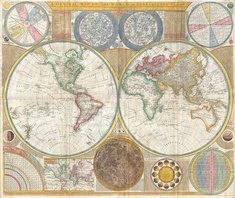|
The Spanish Empire
|
|
32 million
|
|
god, glory, gold
|
|
aztec - cortes
|
|
inca - pizarro
|
|
forced labor
|
|
disease
|
|
population decimation
|
|
columbian exchange
|
|
|
|
How did the Age of Exploration Change the World?
|
|
columbian exchange
|
|
mass migration across atlantic
|
|
shifted power to atlantic
|
|
slave trade
|
|
spread of protestantism
|
|
spurred further exploration
|
|
brought regions of the world together
|
|
|
|
Mercantilism
|
|
wealth = power
|
|
favorable balance of trade
|
|
importance of bullion
|
|
government subsidies
|
|
colonies - source of raw materials, cheap labor, captive markets
|
|
|
|
Triangular Trade
|
|
raw goods from americas to europe
|
|
processed goods from europe to africa
|
|
slaves from africa to americas
|
|
|
|
The Slave Trade
|
|
capture
|
|
auction
|
|
adjustment
|
|
exploitation
|
|
|
|
Effects of the Slave Trade
|
|
depopulation of africa
|
|
constant warfare in africa
|
|
cultural decimation in africa
|
|
racism
|
|
|
|
African Empires
|
|
axum
|
|
nubia
|
|
ghana
|
|
mali
|
|
songhai
|
|
|
|
Social Classes
|
|
peninsulares
|
|
creoles
|
|
mestizoes
|
|
mulattoes
|
|
native americans
|
|
slaves
|
|
|
|
The Commercial Revolution
|
|
entrepreneurship rose
|
|
increase in business activity
|
|
trade shift from mediterranean to atlantic
|
|
former trading cities cut off
|
|
government banks
|
|
joint-stock companies
|
|
money supply increased
|
|
money standardized
|
|
|
|
What is Absolutism?
|
|
unlimited power
|
|
divine right
|
|
considered essential for control
|
|
popular in 16th/17th century europe
|
|
|
|
Impact of Spain's Defeat
|
|
bankrupt
|
|
beginning of english power
|
|
decline of spanish power
|
|
|
|
Henry IV
|
|
increased treasury
|
|
expanded trade
|
|
restored discipline in army
|
|
streamlined bureaucracy
|
|
improved infrastructure
|
|
|
|
Economic/Social Trends
|
|
rising prices
|
|
growing population
|
|
decline of spanish economy
|
|
witchcraft trials
|
|
|
|
Petition of Right
|
|
cannot levy taxes without parliament
|
|
cannot imprison people without just cause
|
|
cannot quarter troops in private homes
|
|
cannot declare martial law except during wartime
|
|
|
|
English Bill of Rights
|
|
cannot raise army without parliament
|
|
cannot suspend laws
|
|
freedom of debate in parliament
|
|
parliament must meet often
|
|
guaranteed individual rights
|
|
|
|
English Civil War
|
|
charles i
|
|
petition of right
|
|
puritan persecution
|
|
nineteen propositions
|
|
charles i executed
|
|
inter-regnum
|
|
charles ii
|
|
cavalier parliament
|
|
james ii
|
|
glorious revolution
|
|
english bill of rights
|
|
|
|
Cardinal Richelieu
|
|
reduced power of nobles
|
|
reduced privileges of huguenots
|
|
strengthened army
|
|
improved economy
|
|
aggressive foreign policy
|
|
french academy
|
|
|
|
Louis XIV
|
|
lavish court
|
|
well-oiled bureaucracy
|
|
absolutist
|
|
versailles
|
|
patron of the arts
|
|
|
|
Louis XIV Legacy
|
|
financial troubles
|
|
weak nobility
|
|
class resentments
|
|
|
|
Frederick William I
|
|
centralized prussian government
|
|
increased revenues
|
|
enhanced production
|
|
made prussian army more efficient
|
|
|
|
Peter the Great
|
|
strengthened russia's image
|
|
took over church
|
|
westernized russia
|
|
built st petersburg
|
|
serfdom entrenched
|
|
increased government revenues
|
|
|
|
Mannerism
|
|
ignored renaissance principles
|
|
figures contorted
|
|
el greco
|
|
|
|
Baroque
|
|
combined renaissance art with religion
|
|
popular with catholic church
|
|
search for power
|
|
emotional
|
|
rubens
|
|
caravaggio
|
|
|
|
Golden Age of Literature
|
|
shakespeare
|
|
cervantes
|
|
de vega
|
|
|
|
Hobbes
|
|
absolute monarchy best form of government
|
|
leviathan
|
|
social contract
|
|
no right to rebel
|
|
|
|
Locke
|
|
natural law
|
|
natural rights to life, liberty, property
|
|
people have right to rebel
|

